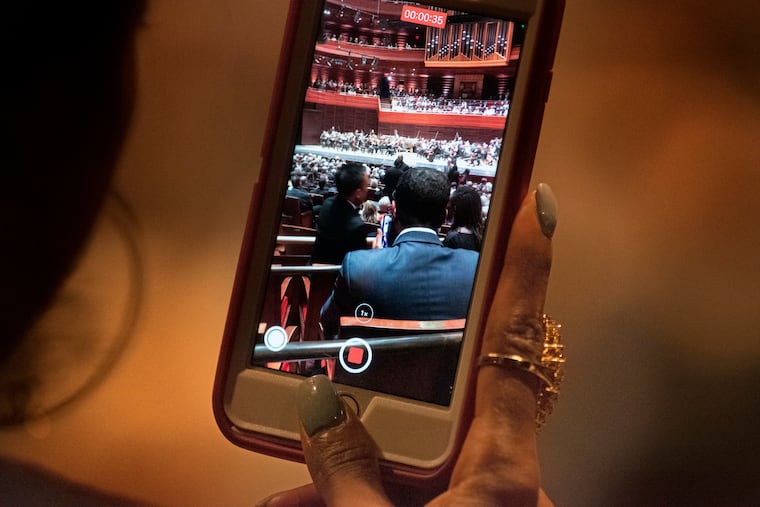Cell phones are ruining public events, like a Philadelphia Orchestra concert. But it’s not just phones.
Why the conventions of how to act in public have broken down isn’t entirely clear.

With a haiku-like clarity, Yannick Nézet-Séguin spoke for all of us Saturday night. Faced with cell phone rings jerking him back from the otherworldliness of the Philadelphia Orchestra, the maestro stopped the music.
“Can we live without the phone for just one damn hour?” he asked the crowd in Verizon Hall.
Saturday night’s cell phone rings broke the spell in Bruckner just as opening the doors of a movie theater during a Hayao Miyazaki film would wash away the color and mood. You can’t forget the rest of the world exists when the outside world is pouring in.
But cell phones aren’t the only interlopers in the concert hall. A man mindlessly fondling a plastic candy wrapper long after the candy was gone; a couple articulating out loud to each other every passing thought; parents bringing crying infants into a concert meant for grown-ups — all of these things have spoiled some part of a concert for me recently.
Why the conventions of how to act in public have broken down isn’t entirely clear.
» READ MORE: Fed up with ringing cell phones, Yannick Nézet-Séguin stops Philadelphia Orchestra music mid-concert — twice
After Saturday’s concert, Nézet-Séguin offered the most charitable of explanations. It’s new listeners, he said, implying that there is some element of the audience not yet familiar with how to act at the orchestra.
“Hopefully we can keep welcoming our new audiences while having them embrace the rituals of the concert,” he said.
But it’s not just the orchestra. Disruptive behavior is now a reliable part of the public square. A lot of the bad behavior I’ve observed in concerts isn’t being perpetrated by new audiences or young listeners. I sense we’re just seeing the concert hall manifestation of a pandemic-induced narcissism. Many have been sitting at home during the past three years with no one to consider but themselves, and it could take a while for people to remember what it’s like to operate in an environment where the world doesn’t revolve around you.
At the Kimmel, disruptive patrons, whomever they are and however they got that way, aren’t entirely at fault. The arts center and orchestra have sent mixed messages about cell phones — “Take selfies and tag us on social media! But do it only at these times. Keep your cell phones on to follow the live program-note app! But don’t record the performance.”
The orchestra wins friendliness points for the speeches it plays before concerts recorded by a variety of players offering cell phone etiquette guidance. But Saturday’s recorded message from concertmaster David Kim, it turns out, inadvertently left out the line about turning off cell phones.
It’s not that listeners can’t take instructions (though some clearly can’t), but after you’ve heard these recorded announcements a few times, they become white noise and people forget. Even the nightly speech Philadelphia Chamber Music Society artistic director Miles Cohen acts out — holding cell phone aloft while turning it off — becomes routine after a while. The practice has surely reduced the incidence of cell phone rings mid-Schubert, but it hasn’t eliminated them.
There’s no obvious answer. Blocking cell phone signals in concert halls probably isn’t advisable for a number of reasons (among them, it is illegal). Instilling a sense of personal responsibility is a nice idea, but wishful thinking isn’t a strategy. It will inevitably fall to the Kimmel Center to figure out a smart way to remind patrons what they need to know, and to keep reminding them. A lighted sign flashing a minute before the downbeat — and again after intermission — seems slightly comical, but it’s worth exploring.
The public discussion around this also needs to consider that some cell phone owners are less rude than they are forgetful and, in a sense, guileless. Sincerely, they need help remembering to do the right thing. Anger, while understandable, isn’t productive.
In the wake of Saturday night’s disruptions, a Kimmel spokesperson Monday morning said the center was discussing options.
A word about Nézet-Séguin’s speech, a cri de coeur for a subtle art form in a noisy world. Most of us are like that meme of a woman lying awake at 4 a.m. thinking about something she should have said during an argument in 2012. But the conductor somehow managed to string together, on the spot, a very few words that cut to the heart of the matter.
If we don’t have time to put down the phone and completely focus on this, he intimated, what do we have time for?
The smartest word in his speech, however, might have been damn. It was a word chosen by someone with a good ear for tone and an unerring sense of timing — in other words, a musician. It was a word that everyone heard the same way. It meant: enough.